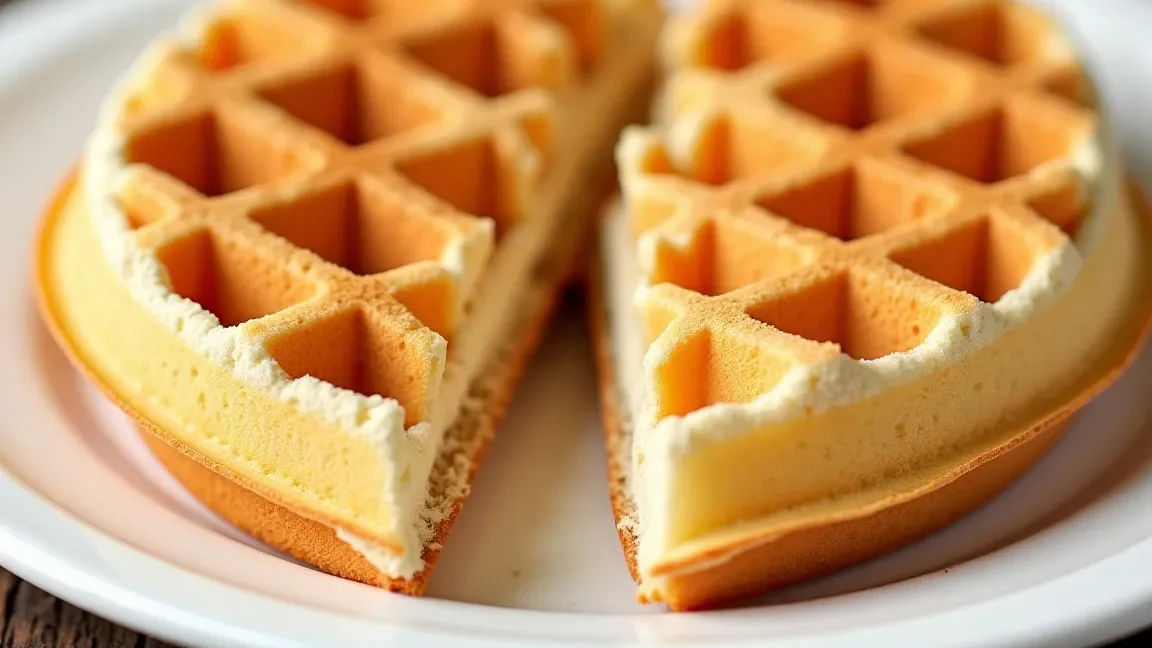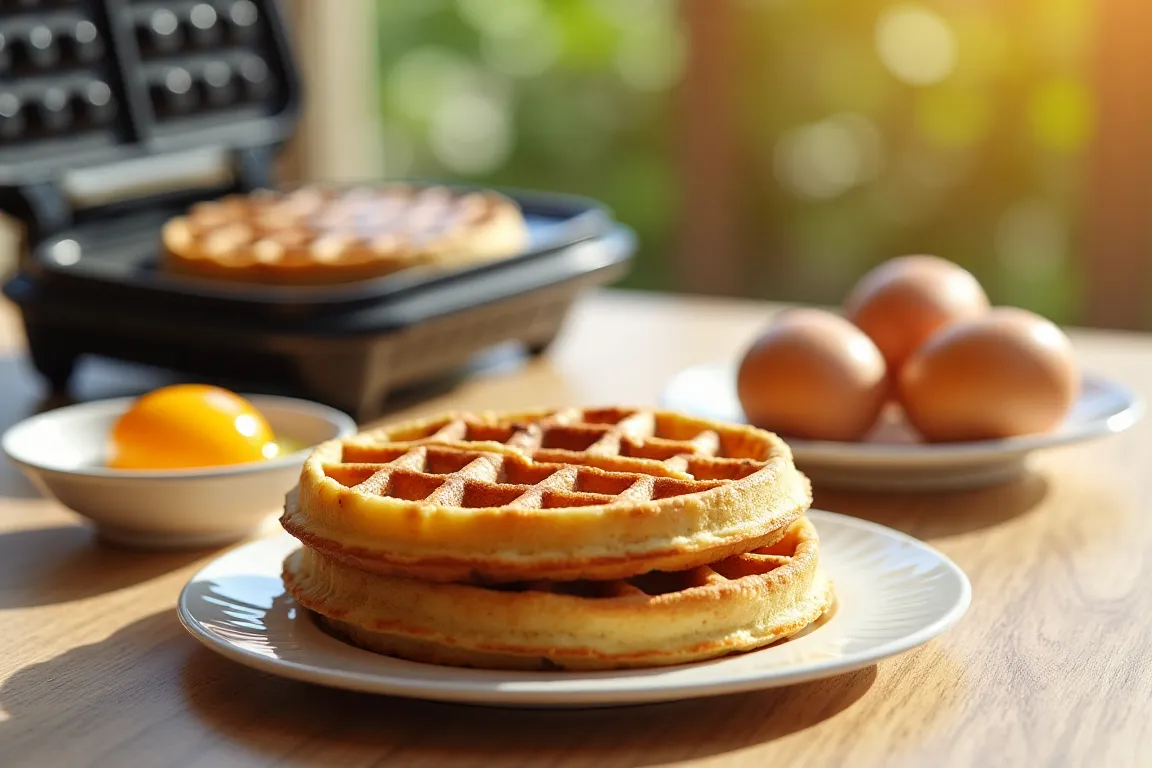Waffles, with their golden brown exterior and soft, airy interior, are a beloved breakfast staple. Achieving the perfect waffle relies heavily on the right mix of ingredients, each playing a critical role. Among these, eggs often stand out as a transformative component. But what exactly does adding an egg to the waffle mix do? Adding an egg to the waffle mix enhances its texture and flavour and improves its structure and nutritional value. Eggs are more than just a simple addition they bring fluffiness, richness, and balance to your waffles. This article explores the science, benefits, and tips for incorporating eggs into your waffle batter, answering the question: What does adding an egg to waffle mix do?
Table of Contents
The Role of Eggs in Waffle Batter
Because of their multifunctional properties, eggs are crucial in many baking recipes, including waffles. But what does adding an egg to the waffle mix do? Adding an egg to the waffle mix influences the waffles’ structure, taste, and overall quality, making them fluffier, more flavorful, and perfectly balanced. Let’s delve into how eggs transform waffles into a breakfast favourite.
How Eggs Improve Texture
Eggs contribute significantly to the texture of waffles. When whisked into the batter, they create a protein network that provides structure and elasticity. This protein matrix traps air during mixing and cooking, giving waffles a signature light and fluffy texture. Without eggs, waffles might feel dense and lack that characteristic bounce.
The Science of Eggs as a Binding Agent
Eggs act as a powerful binding agent in waffle batter. The proteins in eggs coagulate when heated, helping to hold the batter together. This ensures the waffles maintain their shape during cooking, avoiding crumbling or breaking apart. This binding property guarantees the waffles cook evenly and can be easily removed from the iron.
Enhancing Flavor with Eggs
What does adding an egg to the waffle mix do? Eggs play a subtle but crucial role in enhancing the flavour of waffles. They introduce a rich and slightly savoury undertone that perfectly balances the sweetness of the batter. Depending on the number of eggs used, they can deepen the overall flavour, making waffles taste more indulgent and satisfying.
Contributing to the Rise of Waffles
Eggs are not just flavour enhancers; they also contribute significantly to the rise of waffles. Eggs have natural leavening properties that harmonize with baking powder or baking soda. During cooking, the air incorporated into the egg mixture expands, helping the waffles rise and creating a light, tender texture. What does adding an egg to the waffle mix do? It ensures your waffles achieve that lofty, bakery-style quality every time.
Texture and Moisture Benefits
Eggs are not only essential for structural reasons; they also profoundly impact the texture and moisture balance of waffles. Let’s explore how eggs create a perfectly crispy, fluffy, and moist waffle.

Achieving Fluffiness with Eggs
What Does Adding an Egg to Waffle Mix Do? It plays a crucial role in making waffles fluffy. When beaten, eggs incorporate air into the batter. As the waffles cook, this trapped air expands, giving the waffles their soft, airy interior. You can separate the egg whites and yolks for an even fluffier texture. Whipping the whites to stiff peaks before gently folding them into the batter enhances the leavening effect, resulting in a lighter, more delicate waffle texture.
Balancing Moisture Levels
So, what does adding an egg to the waffle mix do? Eggs are vital for balancing the liquid content in the batter. They combine with other wet ingredients to ensure the batter is consistent not too dry or overly runny. Additionally, the fat in eggs adds a richness and tenderness that keeps the waffles moist without making them soggy. This balance is key to perfect waffles every time.
Creating a Crispy Exterior and Soft Interior
What does adding an egg to a waffle mix do? Eggs contribute significantly to the iconic crispy exterior and soft interior of waffles. The proteins in eggs are set quickly under heat, forming a firm, golden crust. Meanwhile, the air and moisture trapped within the batter create steam, producing a soft and tender interior. This dual effect ensures the waffles achieve the ideal balance of crispy and fluffy a hallmark of expertly made waffles.
Eggs combine these benefits to elevate your breakfast experience, making waffles a delight with every bite.
Nutritional Advantages of Adding Eggs
In addition to enhancing the texture and flavour of waffles, eggs provide notable nutritional benefits. Adding eggs to waffle batter improves the recipe’s outcome and increases its health value, making your breakfast more satisfying and nourishing.
Protein Boost in Waffles
Eggs are a rich source of high-quality protein, containing all nine essential amino acids. Incorporating eggs into your waffle mix significantly boosts the protein content, making waffles more filling and ideal for sustaining energy throughout the day. This is particularly beneficial if you’re serving waffles as part of a hearty breakfast or brunch.

Vitamins and Minerals in Eggs
Eggs are a powerhouse of essential vitamins and minerals contributing to overall health. But what does adding an egg to the waffle mix do? Adding an egg to the waffle mix enhances the texture and flavour of waffles and boosts their nutritional value. Eggs contain Vitamin D, which supports bone health and immunity, and Vitamin B12, which aids in energy production and nervous system function. They also provide selenium, an antioxidant that helps protect your body against cellular damage, and choline, essential for brain development and liver function.
Eggs for Energy and Satiety
The combination of protein and healthy fats in eggs helps regulate blood sugar levels and keeps you feeling full for extended periods. This satiety factor means you’re less likely to snack between meals after a waffle breakfast, making it an excellent option for those seeking a balanced diet.
Adding eggs transforms waffles from a purely indulgent treat into a more nutritionally balanced meal that satisfies your palate and your body’s needs.
Substitutes for Eggs in Waffle Mix
For those with dietary restrictions, allergies, or lifestyle preferences, eggs may not always be a feasible ingredient in waffle mix. But What does adding an egg to the waffle mix do? And can these substitutes deliver similar results? Fortunately, numerous alternatives can mimic the role of eggs, allowing you to enjoy delicious waffles without compromise.
Common Alternatives to Eggs
If you’re out of eggs or need a quick substitute, the following options can work as adequate replacements:
- Applesauce Use 1 cup of applesauce that is unsweetened for each egg. This option adds moisture and a mild sweetness to your waffles.
- Yoghurt: Replace one egg with 1/4 cup of plain yoghurt. It provides similar moisture and richness.
- Mashed Banana 1 cup of banana mashed per egg . It imparts a natural sweetness and works well in sweeter waffle recipes.
- Buttermilk: 1/4 cup of buttermilk can also be substituted, adding tangy flavour and moisture to the batter.
Troubleshooting: Problems with Adding Eggs
Tough Waffles
If your waffles are tough, you might have mixed the batter too much. Overmixing makes the gluten in the flour tighten, resulting in a tough texture.
Dense Waffles
Waffles that are too dense need more liquid. Add a little milk or water at a time, mixing gently until the batter is the right consistency.
Rubbery Waffles
Rubbery waffles are usually overcooked. The next time, you can reduce the cooking time by a little. Check your waffle iron’s instructions for recommended cooking times. Different waffle irons cook at slightly different speeds. If you’re using a mix like Krusteaz, you might find these tips for making perfect Krusteaz waffles helpful.
Alternatives to Eggs in Waffle Mix
Egg Substitutes for Waffles
If you can’t use eggs, don’t worry! You can still make waffles. Applesauce, mashed banana, or flaxseed meal work well. These change how your waffles taste and feel a little.
Applesauce in Waffles
Applesauce adds moisture and a slight sweetness. Make sure you use applesauce that has not been sweetened to get the most effective outcomes.
Mashed Banana in Waffles
Like applesauce, mashed bananas add sweetness and moisture. Ripe bananas work best. They also give your waffles a banana flavor.
Flaxseed Meal in Waffles
Flaxseed meal is binder, much like eggs. Mix 1 tablespoon flaxseed meal and three tablespoons of water. Allow it to sit for a couple of minutes to get thicker before adding it in your recipe. This adds a slightly nutty taste.
Remember to adjust the amount of liquid in your recipe if you use a substitute. Too much or too little liquid will change the waffle texture.
Troubleshooting: Sticky Waffles
Waffles Sticking to the Iron
Waffles sticking to your waffle iron usually means your iron isn’t hot enough or it needs more cooking spray. Make sure your waffle iron is hot before you pour in the batter. Lightly grease the iron with cooking spray before each waffle.
Burnt Waffles
Burnt waffles are a sign that your waffle iron is too hot, or the waffles cooked for too long. Lower the heat setting or reduce the cooking time. Check your waffle iron’s instructions.
Fixing a Sticky Waffle Iron
A sticky waffle iron can be cleaned easily. Let the iron cool completely. Then, wipe away any stuck-on bits with a damp cloth or sponge. For tougher messes, use warm, soapy water. Do not immerse the waffle iron in water.
Frequently Asked Questions
Why are my waffles tough?
Tough waffles are often caused by overmixing the batter. Overmixing makes the gluten in the flour tighten, leading to a tough texture. Mix until the ingredients are mixed.
How can I fix dense waffles?
Dense waffles usually need more liquid. Add a little milk or water at a time, mixing gently, until the batter reaches the right consistency.
What causes rubbery waffles?
Rubbery waffles are typically overcooked. Try reducing the cooking time a bit next time. Always check your waffle iron’s instructions for recommended cooking times.
My waffles are sticking to the iron. What should I do?
Waffles sticking to the iron usually mean your iron isn’t hot enough or needs more cooking spray. Ensure your iron is hot before pouring in batter and lightly grease it with cooking spray before each waffle.
Why are my waffles burning?
Burnt waffles usually mean your waffle iron is too hot, or the waffles cooked too long. Lower the heat or reduce cooking time. Check your waffle iron’s instructions.
How do I clean a sticky waffle iron?
Let the iron cool completely. Then, wipe away stuck bits with a damp cloth or sponge. For stubborn messes, use warm, soapy water. Don’t submerge your waffle maker in water.
What are some good egg substitutes for waffles?
Applesauce, mashed banana, or flaxseed meal work well. Remember to adjust the liquid in your recipe if using a substitute. Each substitute slightly alters the taste and texture.
How do I use flaxseed meal in waffles?
Mix 1 teaspoon of the flaxseed meal in three tablespoons of water. Allow it to sit for until it has thickened and then add it back to the batter.It is an adhesive, similar to eggs.
Conclusion: Better Waffles with Egg Knowledge
This guide shows you how adding an egg affects your waffles. Eggs help bind ingredients, add richness, and give waffles a better texture. You now know how to troubleshoot common waffle problems. Knowing the role of eggs helps you make delicious waffles every time. Experiment with egg substitutes if needed. Enjoy your perfectly made waffles!
